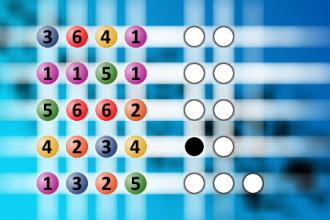Which is a winning combination of digits?
The computer chose a secret code (sequence of 4 digits from 1 to 6). Your goal is to find that code. Black circles indicate the number of hits on the right spot. White circles indicate the number of hits on the wrong spot.Correct answers: 18
The first user who solved this task is Nasrin 24 T.
#brainteasers #mastermind

A big-city lawyer was represen...
A big-city lawyer was representing the railroad in a lawsuit filed by an old rancher. The rancher's prize bull was missing from the section through which the railroad passed. The rancher claimed that the bull must have been hit by the train, and wanted to be paid the fair value of the bull. The case was scheduled to be tried before the justice of the peace in the back room of the general store.
As soon as the rancher showed up, the attorney for the railroad pulled him aside and tried to get him to settle out of court. The lawyer did his best selling job, and finally the rancher agreed to take half of what he was asking.
After the rancher had signed the release and took the check, the young lawyer couldn't resist gloating a little over his success, telling the rancher, "You know, I hate to tell you this, old man, but I put one over on you in there. I couldn't have won the case. The engineer was asleep and the fireman was in the caboose when the train went through your ranch that morning. I didn't have one witness to put on the stand. I bluffed you!"
The old rancher replied, "Well, I'll tell you, young feller, I was a little worried about winning that case myself, because that darned bull came home this morning."
As soon as the rancher showed up, the attorney for the railroad pulled him aside and tried to get him to settle out of court. The lawyer did his best selling job, and finally the rancher agreed to take half of what he was asking.
After the rancher had signed the release and took the check, the young lawyer couldn't resist gloating a little over his success, telling the rancher, "You know, I hate to tell you this, old man, but I put one over on you in there. I couldn't have won the case. The engineer was asleep and the fireman was in the caboose when the train went through your ranch that morning. I didn't have one witness to put on the stand. I bluffed you!"
The old rancher replied, "Well, I'll tell you, young feller, I was a little worried about winning that case myself, because that darned bull came home this morning."

